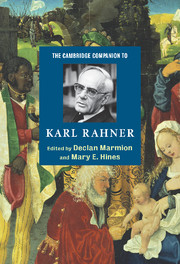Book contents
- Frontmatter
- Introduction
- Part I Spiritual, Philosophical, and Theological Roots
- Part II Theological Investigations
- 4 Method in theology
- 5 Revelation and faith
- 6 Trinity
- 7 Christology
- 8 Ecclesiology and ecumenism
- 9 Ministry and worship
- 10 Ethics
- 11 Eschatology
- Part III Conversations Ongoing
- Part IV Retrospect and Prospect
- Appendix
- Index
8 - Ecclesiology and ecumenism
from Part II - Theological Investigations
Published online by Cambridge University Press: 28 May 2006
- Frontmatter
- Introduction
- Part I Spiritual, Philosophical, and Theological Roots
- Part II Theological Investigations
- 4 Method in theology
- 5 Revelation and faith
- 6 Trinity
- 7 Christology
- 8 Ecclesiology and ecumenism
- 9 Ministry and worship
- 10 Ethics
- 11 Eschatology
- Part III Conversations Ongoing
- Part IV Retrospect and Prospect
- Appendix
- Index
Summary
Since I am a human being and a Christian, it is obvious to me that I am a Christian in the Church, an ecclesial Christian.
Karl Rahner's writings on “the Church” are significant in volume, in content, and in their connection to the central concerns of Rahner's life and work. For Rahner, the Church was always more than a social structure, a political force, or a site for religious activities; the Church was a genuinely theological reality. Rahner affirmed an intimate connection between the Church and the foundational elements of Christian faith: God's self-revelation in Jesus Christ; the presence of the Holy Spirit in human history; and God's promise that love, rather than sin or death, would speak the final word in that history.
Just as Rahner’s emphasis on the capacity of human beings to encounter God in their everyday world resulted in a theology of eating, of laughing, and of childhood and old age, so too it ensured that the Church’s relationship to history and culture was a prominent feature of his ecclesiology. For Rahner, living as an ecclesial Christian was an invitation to be part of the world in a particular way, a way that witnessed not simply to humanity’s orientation to God, but to the social implications of God’s self-revelation in Jesus Christ. To that end, Rahner was at pains to aid the appropriation of ecclesial faith by articulating the authentic claims and necessary boundaries of “the Church,” by promoting reconciliation between Christians, and by sketching the possibilities for the Church’s creative engagement with the wider world.
- Type
- Chapter
- Information
- The Cambridge Companion to Karl Rahner , pp. 128 - 143Publisher: Cambridge University PressPrint publication year: 2005
- 1
- Cited by



